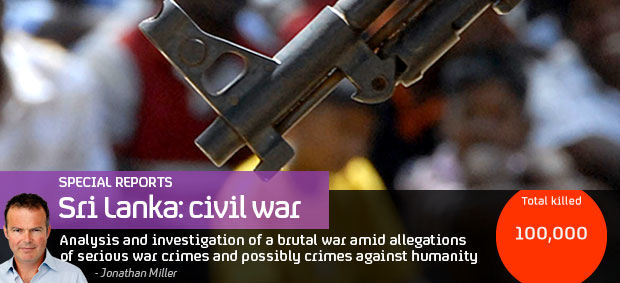Sri Lanka ‘war crimes’ video: woman’s body identified
Channel 4 News can name a woman journalist as one of the victims in the Sri Lanka execution video along with damning new details of the date and location where the video was filmed.
Warning: this page contains disturbing images.
After extensive investigations Channel 4 News can reveal that one of the victims was a high profile member of the Tamil Tigers press and communications wing.
Shoba – whose nom de guerre was Isaipriya – was aged 27 when she died, and was identified by a friend speaking on condition of anonymity.
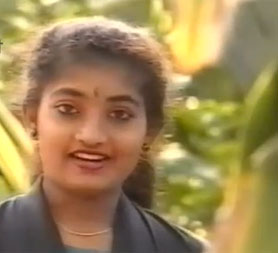
The distressing execution video footage, screened by Channel 4 News last week and originating in Sri Lanka, shows a number of incidents of soldiers in uniform shooting in the head people who appear to be unarmed – described as “cold-blooded killing” by an international expert. The video also shows the bodies of other men and women lying on the ground.
Leading war crimes lawyer Julian Knowles, from Matrix Chambers, told Channel 4 News the video was “astonishing evidence” of a type he had only seen “a handful of times” showing the mass killing of civilians or unarmed combatants, a serious war crime.
The video was shot towards the end of Sri Lanka’s 26-year civil war, which ended in 2009, between the government and the Liberation Tigers of Tamil Eelam (LTTE) group, known as the Tamil Tigers.
Read more from war crimes lawyer Julian Knowles on the 'astonishing evidence' of the Sri Lanka video
Channel 4 News can now reveal that one of the victims was a high profile member of the Tamil Tigers – but her role was as a journalist rather than a direct fighter as a result of a heart condition.
Identity of the victim
One of the women shown in the video has been identified by a close colleague and friend, speaking to Channel 4 News, as the Tamil journalist, Isaipriya (pictured above).
Isaipriya was part of the Tamil Tigers, her former colleague told us. She identified that Isaipriya’s body appears in the “war crimes” video, partially covered by a sheet, with cuts to the face.
“Isaipriya never carried a gun and her physical condition did not permit her to go to the battlefield.” Friend and colleague of Isaipriya
She said: “Isaipriya joined the LTTE. Because of her physical condition, she was deployed to the media unit. She was in the production team. She did some acting. She was a TV presenter. She was a dancer.
“She never carried a gun and her physical condition did not permit her to go to the battlefield. She always had either a camera, a pen or a notepad.”
Evidence of who may be responsible
While Isaipriya’s body is seen in a video which includes footage of executions, it is unclear how she died. The identities of the soldiers – who look directly at the camera at times in the video – are also unclear from the video, although the fact that they speak Sinhalese suggests they are government troops rather than Tamil fighters.
However, it has emerged that the date of her death and the soldiers who killed her are both listed on the Sri Lankan Ministry of Defence website, fixing the date of the video more accurately and indicating which troops were active at that time.
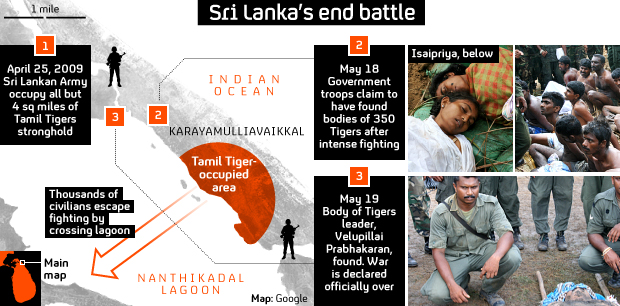
The list says she was killed, along with 31 other LTTE leaders, on 18 May 2009 by 53 Division troops, an “offensive” attack force of the Sri Lanka Army commanded by Major General Kamal Gunaratne.
The Sri Lanka High Commission told Channel 4 News: “The High Commission of Sri Lanka wishes to reiterate that ‘Lt. Col. Issei Piriya’ was engaged in a hostile operation against the Sri Lanka Security Forces when she met her end.
“Sri Lanka has established the Lessons Learnt and Reconciliation Commission the mandate of which is to look into matters relating to the conflict from 2002 to 2009.
“The testimony being presented to the Commission by people from all walks of life, especially from the North and from the East is proof of their confidence, in the workings of the Commission.
“Therefore, it is important that we allow this domestic mechanism to achieve its objectives.”
Photographs separately obtained by Channel 4 News also appear to suggest that Isaipriya was captured by soldiers on 18 May 2009.
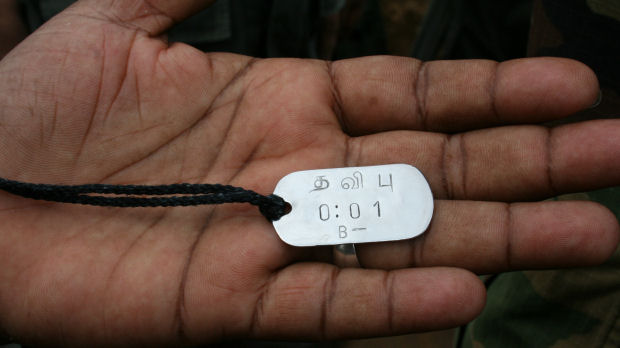
Check out a Channel 4 News photo gallery of the 'end battle' in Sri Lanka, and of the wider events of the Sri Lanka war
In two images, Isaipriya can be seen with another woman lying in a trench. It is unclear if she is alive or dead, but the photographs’ date stamps are 18 May 2009 and it appears that the hands of both women are tied.
Battle
The 18 May 2009 – when Isaipriya appears to have died and a date which appears the video may have been shot, or possibly the day after – was the penultimate day in the course of the 26-year war in Sri Lanka. The following day, the leader of the Tamil Tigers, Velupillai Prabhakaran, was killed by government troops and the government declared the war over.
Channel 4 News has also obtained photographs of the scenes following his death, when his body was identified – which are taken by the same camera as those of Isaipriya, and date stamped 19 May 2009, further authenticating the dates.
Prabhakaran’s death (his body is pictured left) followed four days of intense fighting, including the 18 May, known as the “end battle”. During these four days of fighting, on a 4km strip on the north east coast of Sri Lanka, Tamil Tiger fighters were cut off by government troops, and eventually the majority were killed in the fighting or, the Ministry of Defence says, in “mopping up” operations.
Over the 18 and 19 May, after the army defeated the Tamil Tigers, the army “commenced clearing operations to neutralize possible enemy pockets and to collect the bodies and captured LTTE assets”, according to the Sri Lankan Ministry of Defence account of the battle.
These “clearing operations” saw them find 350 bodies and identify 30 as what they call “top level LTTE cadres”, including – according to their list – Isaipriya.
It is unclear whether Isaipriya died in combat, in “mopping up” or “clearing operations”, or in an execution as with other victims pictured in the video – but lawyer Julian Knowles said the evidence indicated the latter.
After considering the photo and video, he said: “To my eye, two things stand out – one is the fastening of the hands behind the back. It’s difficult to see how that could have happened if this death occurred in the course of battle.
“I’m sure these mopping up operations did involve the mass killing of civilians or combatants who were trying to surrender. Mopping up operations is really just a euphemism.” International war crimes lawyer, Julian Knowles
“Secondly there’s the absence of any weapons – and thirdly the bodies look posed or arranged. They don’t look like they’ve fallen necessarily in battle as the result of a battle-led injury, so it’s difficult to think of a mechanism how they could have died other than a cold blooded execution.”
He said that even if she had been injured in battle and left to die by the soldiers pictured in the video, that still constituted a grave breach of the Geneva Convention.
He added: “There’s a very fine line between genuine military operations and just killing unarmed pockets of soldiers who may be trying to surrender,” said Mr Knowles.
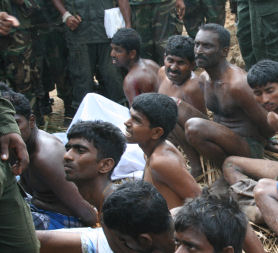
“And certainly the Tamils that one sees before their deaths they don’t look the most resilient of fighting troops and I’m quite sure these mopping up operations did involve the mass killings of civilians or combatants who were trying to surrender. Mopping up operations is just really a euphemism.”
Investigation
Taking part in these operations, and at the centre of the last few days of fighting, were troops from Division 53 of the Sri Lanka Army – the division claiming responsibility for Isaipriya’s death.
Along with Divisions 58 and 59, 53 took part in the “end battle”. Tamil eye witnesses also present in the “end battle” have visually identified from geographic markers a potential location of the massacre from the footage, on a strip of land between the lagoon and the sea – south of where Prabhakaran died and in the midst of the fighting over 18 and 19 May.
Who are Sri Lanka Army's 53 Division? Channel 4 News investigates.
Channel 4 News has sent the video, which is a longer version of a video authenticated by the United Nations and broadcast last year, to the United Nations panel which is considering whether there should be an international inquiry into events in Sri Lanka. Both sides – the government troops and Tamil Tigers – are accused of targeting civilians and committing war crimes.
Mr Knowles said: “On the question of whether there should be an inquiry, this is astonishingly powerful evidence of a type I’ve only seen in a handful of times – there’s some footage from Yugoslavia about mass killings – and this is up there. It’s within a very very rare category of evidence where killings are actually captured on tape and the idea that there can be a debate about whether there should be an investigation in the face of evidence like this is very surprising.
“So this evidence should lead to only one conclusion which plainly is there needs to be a full investigation and there needs to be prosecution of the people responsible.
He added: “While the Sri Lankan government may be denying the authenticity or maybe giving a different version of events, the way to solve what happened is for the Sri Lankan government to allow an independent investigation.”
Watch the original report below
Images on this page were provided by sources to Channel 4 News.

